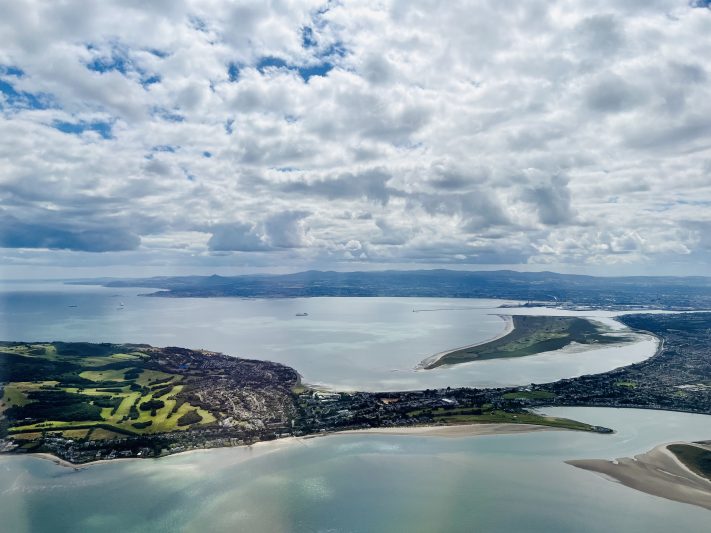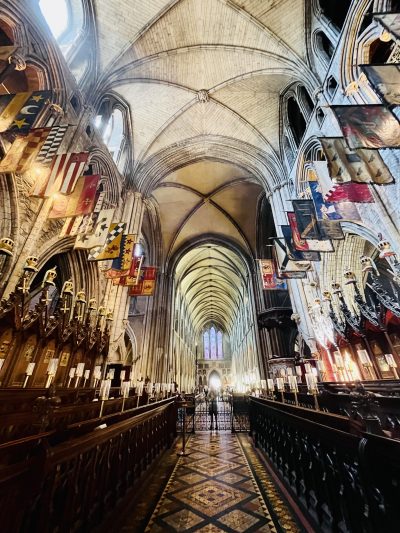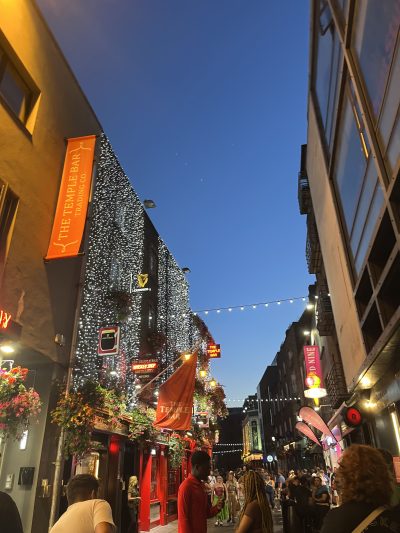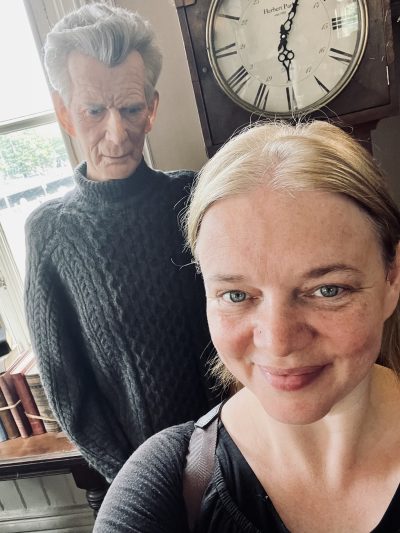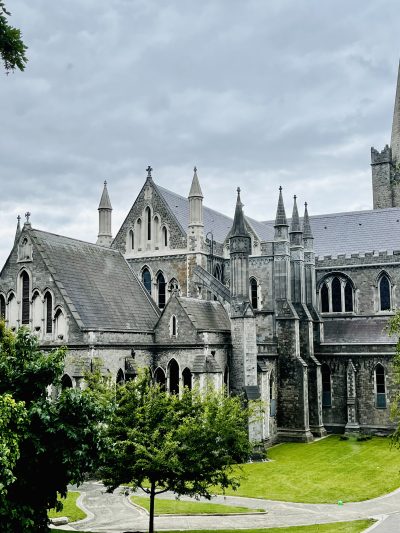On the 4th of August, I flew from Scotland to Dublin, Ireland, snapping photos of the changing landscape from my Aer Lingus window seat. My flight was delayed so what had promised to be a relaxed afternoon would now be a mad rush to grab SIM cards and keys and bedding and groceries. I rang the Irish Writers Centre from the baggage turnstile with apologies that I might be late.
In early 2020, I’d been awarded the first inaugural Max Margles Writing Residency, a Quebec Writers’ Federation initiative spearheaded by Roslyn Margles in honour of her late husband Max, a voracious reader and supporter of the arts. On the 10th of March that year I met with QWF Executive Director Lori Schubert and Program Manager Rachel McCrum to discuss the details. Later that evening, the French school I’d been attending shut down. The next day, Montréal effectively did as well. Two years of cancellations followed, and I began to think I was never getting to Dublin.
The cab driver waits for me outside the Dublin City Arts Office while I grab the keys to St. Patrick’s Lodge, a former park warden’s house that will be my home and writing space for the next month. The city is a veritable sea of tourists adorned with parks, colourfully-painted shops and double-decker buses. When I reach the Irish Writers Centre, the staff offer respite. They have coffee and stories. They have sheets and towels and duvet covers that Rachel purchased for me when she’d come through Ireland the month before. The Centre’s Director Valerie Bistany gives me a tour of the historic building, its collection of artwork and many beautiful rooms, each named for a celebrated Irish writer.
When the pandemic hit, I was stuck in a studio apartment in Montréal’s Plateau with just my cat for company. I left tips for the grocery delivery guy halfway down the hallway, and he left the groceries in the same place when he arrived, waiting for me to open the door and watch as he backed away, double-masked and slick with hand sanitizer. He was the only human I saw for months. They’d shut the bridges to the island so we wouldn’t infect the rest of the province. The police patrolled the parks, shooing us home if we tried to linger. Then they introduced a curfew that saw us locked in every night at 9 p.m. Each day they posted the numbers of newly dead in our neighbourhoods.
After the tour, Valerie walks me and my luggage to a taxi that carries me over the River Liffey to the grounds where St. Patrick is said to have baptized the first Christians of Ireland. The driver’s children went to choir school here, but he has no idea where the house is. We circle a few times, and he finally deposits me close by the Cathedral. It’s a hot day. I drag my suitcase and bags of bedding around the park’s sunbathers and coffee drinkers. Eventually, I spot the little cottage I’d seen in the photographs and dig the keys out of my bag, climb the stairs.
I’ve had COVID three times now, including the dreaded alpha version, when it was more life-threatening medical anomaly than flu-like virus. I feel lucky and tired. What does it mean to survive a pandemic? We’ll find out when it’s over, I suppose. I do know that at some point, I stopped being afraid. At some point, I just needed to get out of the house at any cost, to ride the metro without a mask, to push through throngs at a sidewalk sale, to sit on a terrace in Montréal’s Old Port on a nice summer evening watching the jugglers and the caricature artists. I would have risked my life for these moments of normalcy. And to fly home to Newfoundland to see my family and stand by the ocean. To move a little more freely in the world.
The weekend after I arrive in Dublin, I’m downstairs in my pyjamas eating toast and reading the news on my laptop. Just beyond the old railing of the front balcony looms the medieval and imposing St. Patrick’s Cathedral. I take a sip of coffee, then catch movement out of the corner of my eye. A little boy scampers up to one of the middle windows, cupping his hands around his eyes to see what’s inside my living room. I lay down my toast and fix my best smile. He scans from the far end of the room over to the couch where I am sitting, jumps a foot off the ground, and runs off screaming someone’s in there, someone’s in there!
I’ve been going home to Newfoundland more often this last year. A pandemic can really drive your craving for small-town life. When I got the email in the fall of 2021 confirming the residency had been booked for August this year, that’s where I was, sitting in my temporary office in my father’s house in Trepassey, stringing together the bits and pieces I’d written over the course of a decade for my long-promised novel. You must be excited, everyone said. But after two prior cancellations, I still felt unsure. My response was I’ll believe it when I’m on the ground in Dublin.
The bells of St. Patrick’s ring every hour on the hour and all through the night. Jonathan Swift, the famed author of Gulliver’s Travels, was Dean for more than 30 years before his death and is buried beneath the floor. I sleep closer to the Cathedral’s outdoor graveyard, which holds some 500 bodies and is flanked on the other side by the purportedly-haunted, 300-year-old Marsh’s Library. Well-frequented by Swift, other visitors to the library included James Joyce, a misplaced mummy named Maurice and a young Bram Stoker, who researched Transylvania there decades before he published Dracula. When I hear this, I feel a little better about how long my novel is taking. Sometimes things just need to incubate, I guess.
How’s it going up there, Dad asks, and I rattle off the things I did today: the wax museum, a walk through the grounds of Trinity College, a stop at Hodges Figgis bookstore. Did you get any writing done, he asks. I guess it’s that first taste of freedom after lockdown, but it’s been hard to stop moving. First I ran to Newfoundland where I spent my days driving the cliffs looking for whales. Then my siblings and I met in Scotland to see the little town our grandmother grew up in and to wander the countryside. I have a list a foot long of things to do in Ireland and tickets to Paolo Nutini in Limerick in a week. But, Dad points out, you have a book to write.
Do I believe I’m finally in Dublin? Well, it’s starting to sink in. St. Stephen’s Green, Temple Bar and busker-laden Grafton Street are all within a 10-minute walk of here. Music pipes through many doorways and the alleys and barroom walls are scrawled with quotes from famous books and songs. Every few feet it seems is another beautiful sculpture of a famous writer, singer, or rebel. The Rare Auld Times plays in a loop in my head when I’m out walking, though I don’t remember that Dublin City, of course. And now this Dublin City will have to wait a while so I can work.
I sit in the living room in my pyjamas, eating toast, staring at a paragraph that’s yet to be written. One of the park’s maintenance workers is out front, painstakingly recoating the gold tips of the garden’s iron fencing. I can hear each scrape of the paint can as he moves along the line, each cough, each small chat he has with the regulars who pass him by. Some tourists stop to ask for directions to the Guinness Storehouse. Moments later, the sky bursts open with heavy rain, and he dashes off.
Through the window, I can see the park below has emptied. It’s just me, the wet trees, and the ghosts of St. Patrick today. Not great weather for wandering, I suppose. I shrug. I sigh. I lean over the keyboard and begin to type.
